As a business owner, leader, and nerd, I like to read books, both business and for fun. It’s therapeutic and I’m a perpetual learner, so it fills that piece of my mind and heart. It’s also good for Hitch Studio as we lead a group of amazing employees! Here are my favorite books so far, dished up to you five at a time. I ranked them with stars (5 being the best) and I’ve affectionately named this list:
“Badass Business-Building Books”
- How to Win Friends and Influence People by Dale Carnegie
- The Four Agreements by Don Miguel Ruiz
- You are a Badass by Jen Sincero
- The 7 Habits of Highly Effective People by Stephen Covey
- Permission to Screw Up by Kristen Hadeed
Alright, let’s get this party started with this edition of Best Business Books I’ve Read So Far (Volume 1):
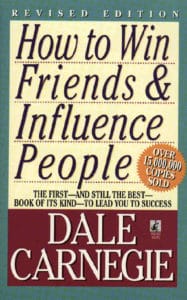 How to Win Friends and Influence People
How to Win Friends and Influence People
Author: Dale Carnegie
Who should read it: New managers, anyone in business
Rating: * * * * * (5 stars)
Favorite Quotes:
“Criticism is futile because it puts a person on the defensive and usually makes him strive to justify himself. Criticism is dangerous, because it woods a person’s previous pride, hurts his sense of importance, and arouses resentment.”
“When dealing with people, let us remember we are not dealing with creatures of logic. We are dealing with creatures of emotion, creating bristling with prejudices and motivated by pride and vanity.”
“Any fool can criticize, condemn, and complain— and most fools do. But it takes character and self-control to be understanding and forgiving.”
“There is only one way under high heaven to get anybody to do anything. And that is by making the other person want to do it.”
“I have yet to find the person, however great or exalted his station, who did do better work and put forth greater effort under a spirit of approval than he would ever do under a spirit of criticism.”
“Always make the other person feel important.”
“Talk to people about themselves and they will listen for hours.”
“You are leaders. You will be most effective when you lead by example.”
“Asking questions not only makes an order more palatable, it often stimulates the creativity of the persons whom you ask. People are more likely to accept an order if they have had a part in the decision that caused the order to be issued.”
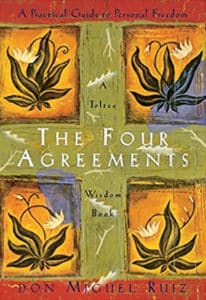 The Four Agreements
The Four Agreements
Author: Don Miguel Ruiz
Who should read it: Anyone needing a boost in assertiveness, confidence, and handling conflict — or going through a tough relationship
Rating: * * * * * (5 stars)
Favorite Quotes:
“In your whole life nobody has ever abused you more than you have abused yourself. And the limit of your self-abuse is exactly the limit that you will tolerate from someone else. If someone abuses you a little more than you abuse yourself, you will probably walk away from that person. But if someone abuses you a little less than you abuse yourself, you will probably stay in the relationship and tolerate it endlessly.”
“You will only receive a negative idea if your mind is fertile ground for that idea. When you become impeccable with your word, your mind is no longer fertile ground for words that come from black magic.”
“Nothing other people do is because of you. It is because of themselves. If someone gives you an opinion and says, ‘Hey, you look so fat,’ don’t take it personally, because the truth is that this person is dealing with his or her own feelings, beliefs, and opinions. That person tried to send poison to you and if you take it personally, then you take that poison and it becomes yours. Taking these things makes you easy prey… They can hook you easily with one little opinion and feed you whatever poison they want, and because you take it personally, you eat it up.”
“If someone is not treating you with love and respect, it is a gift if they walk away from you. If that person doesn’t walk away, you will surely endure many years of suffering with him or her. Walking way may hurt for a while, but your heart will eventually heal. Then you can choose what you really want. You will find that you don’t need to trust others as much as you need to trust yourself to make the right choices.”
“Often when you go into a relationship with someone you like, you have to justify why you like that person. You only see what you want to see and deny there are things you don’t like about that person. You lie to yourself just to make yourself right. The you make assumptions, and one of the assumptions is, ‘My love will change this person.’ But this is not true. Your love will not change anybody. If others change, it’s because they want to change, not because you can change them. Then something happens between the two of you, and you get hurt. Suddenly you see what you didn’t want to see before, only now it is amplified by your emotional poison. Now you have to justify your emotional pain and blame others for your choices.”
“Doing your best is taking the action because you love it, not because you’re expecting a reward.”
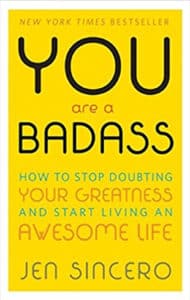 You Are a Badass
You Are a Badass
Author: Jen Sincero
Who should read it: Anyone needing a laugh and a boost in how to start living life to your greatest f-ing potential
Rating: * * * * * (5 stars)
Favorite Quotes:
“We need smart people with huge hearts and creative minds to manifest all the wealth, resources, and support they need to make their difference in the world. We need people to feel happy and fulfilled and loved so they don’t take their shit out on themselves and other people and the planet and our animal friends. We need to be surrounded by people who radiate self-love and abundance so we don’t program future generations with gnarly beliefs like money is bad and I’m not good-enough and I can’t live the way I want to live. We need kickass people to be out of struggle and living large and on purpose so they can be an inspiration to others who to want to rise up, too.”
“When we’re happy and all in love with ourselves, we can’t be bothered with the bullshit (or own or other people’s).”
“You aren’t a selfish person for taking care of yourself — just a happier one.”
“Giving is one of our greatest joys…and the more you give, the more you receive.”
“Whenever anything excellent or mediocre or lame or annoying happens to you, meet it with this statement, “This is good because ________. Once you make this a regular practice, you’ll see how much easier it is to be in gratitude for much more than you realized.”
“There’s no better teacher than necessity.”
“Passion trumps fear.”
“If you’re serious about change your life, you’ll find a way. If you’re not, you’ll find an excuse.”
“When we agree to let ourselves down in favor of supporting the bad behavior of others, it often stems from the same impulse: We’re unwilling to make other people more uncomfortable than they just made us; it’s about standing up for your highest self. It’s about respecting yourself, instead of catering to your insecure need to be liked.”
“…a common trait of successful people is that they make decisions quickly and change them slowly.”
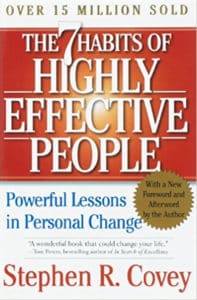 The 7 Habits of Highly Effective People
The 7 Habits of Highly Effective People
Author: Stephan Covey
Who should read it: Anyone wanting to grow personal or professional relationships with principle-based values.
Rating: * * * * * (5 stars)
Favorite Quotes:
“…principles are deep, fundamental truths that have universal application. Principles are not values. A gang of thieves can share values, but they are in violation of the fundamental principles we’re talking about [fairness, integrity, honesty, human dignity, service, quality, excellence, potential, growth, patience, nurturance, and encouragement]. Principles are the territory. Values are maps.”
“…always treat your employees exactly as you want them to treat your best customers.”
“Reactive people are driven by feelings, by circumstances, by conditions, by their environment. Proactive people are driven by values—carefully thought about, selected and internalized values.”
“Let people learn from your mistakes or the mistakes of others. Point out the potential failure paths, what NOT to do, but don’t tell them what TO do. Keep the responsibility for results with them — to do whatever is necessary within the guidelines.”
“I have a friend who son developed an avid interest in baseball. My friend wasn’t interested in baseball at all. But one summer, he took his son to see every major league team play one game. The trip took over six weeks and cost a great deal of money, but it became a powerful bonding experience in their relationship. My friend was asked on his return, ‘Do you like baseball that much?’ ‘No,’ he replied, ‘but I like my son that much.’
“The cause of almost all relationship difficulties is rooted in conflicting or ambiguous expectations around roles and goals.”
“When we truly love others without condition, without strings, we help them feel secure and safe and validated and affirmed in their essential worth, identity, and integrity. Their natural growth process is encouraged. We make it easier for them to live the laws of life — cooperation, contribution, self-discipline, integrity—and to discover and live true to the highest and best within them. We give them the freedom to act on their own inner imperatives rather than react to our conditions and limitations. This does not mean we become permissive or soft. We counsel, we plead, we set limits and consequences. But we love, regardless.”
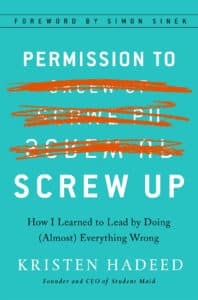 Permission to Screw Up
Permission to Screw Up
Author: Kristen Hadeed
Who should read it: Entrepreneurs who are at least 6-months into their business
Rating: * * * * * (5 stars)
Favorite Quotes:
“Trust people with responsibilities, allow room for mess-ups, then give them the chance to fix their mistakes so they can learn from them.”
“Instead of solving their problem for them, I asked them what they thought the solution should be. It was my responsibility to guide and support the Student Maid team—not to direct their actions, make their decisions, and solve their problems for them. It was my job to provide them with opportunities where they could develop grit, self-reliance, and self-confidence.”
“In this case, FBI is an approach to giving feedback that is lightyears beyond the sandwich method in terms of effectiveness. The class helped me understand that the problem with the way most people give feedback —whether it’s sandwiched between positive affirmations or not—is that we don’t deliver it in a way that inspires the recipient to change their behavior. Barry-Wehmiller teaches that if you want to give truly effective feedback, you need to communicate three things: the way you feel, the specific behavior that made you feel that way, and the impact that behavior has—whether it’s on you, the company, your relationship with that person, or anything else. Feeling-Behavior-Impact. F.B.I. …When we give someone all three pieces, they’ll usually be inspired to repeat that behavior —again and again and again.”
“The leadership team set the tone for the office, so when we didn’t go out of our way to talk to anyone, our students didn’t either.”
“Being vulnerable and open and allowing people to feel at work isn’t about crying with someone. It’s about understanding what they’re going through so you can work better together.”
“Marty [Schaffel] told me he believed there was a big difference between managers and leaders. Managers, he explained, give orders, not ownership. Leaders, on the other hand, ask themselves, ‘How do I get this person to do what I want them to do and make sure they feel good about doing it?’”
“If somone’s good qualities outweigh the bad, we fill fight for that person. That means that if someone’s heart is in the right place, if they live the company’s values, if they make decisions with the best intentions, if they put their best food forward, and if they try hard, we will be fiercely loyal to them, and we will give them changes to screw up and learn. But if someone doesn’t care about improving or if they don’t overcome a weakness after we both commit to an improvement plan, then they have to go. At that point, their actions could become a threat to the culture, the business, or both…”
“Invest anyway. That’s what I’ve learned. I’ve found that even if you have the best culture in the world—where there are deep relationships, where people feel valued, where there’s a high level of trust, where open communication and feedback are the norm—people will still want to leave. It doesn’t mean something is wrong with your company or your leadership. In fact, I believe a leader’s success isn’t measured only by the people who are sticking around. It’s also measured by the people who feel free to move on and leave even better for having worked with you.”
Do you have some favorites? I’d love to read more than what’s on my never-ending list!
